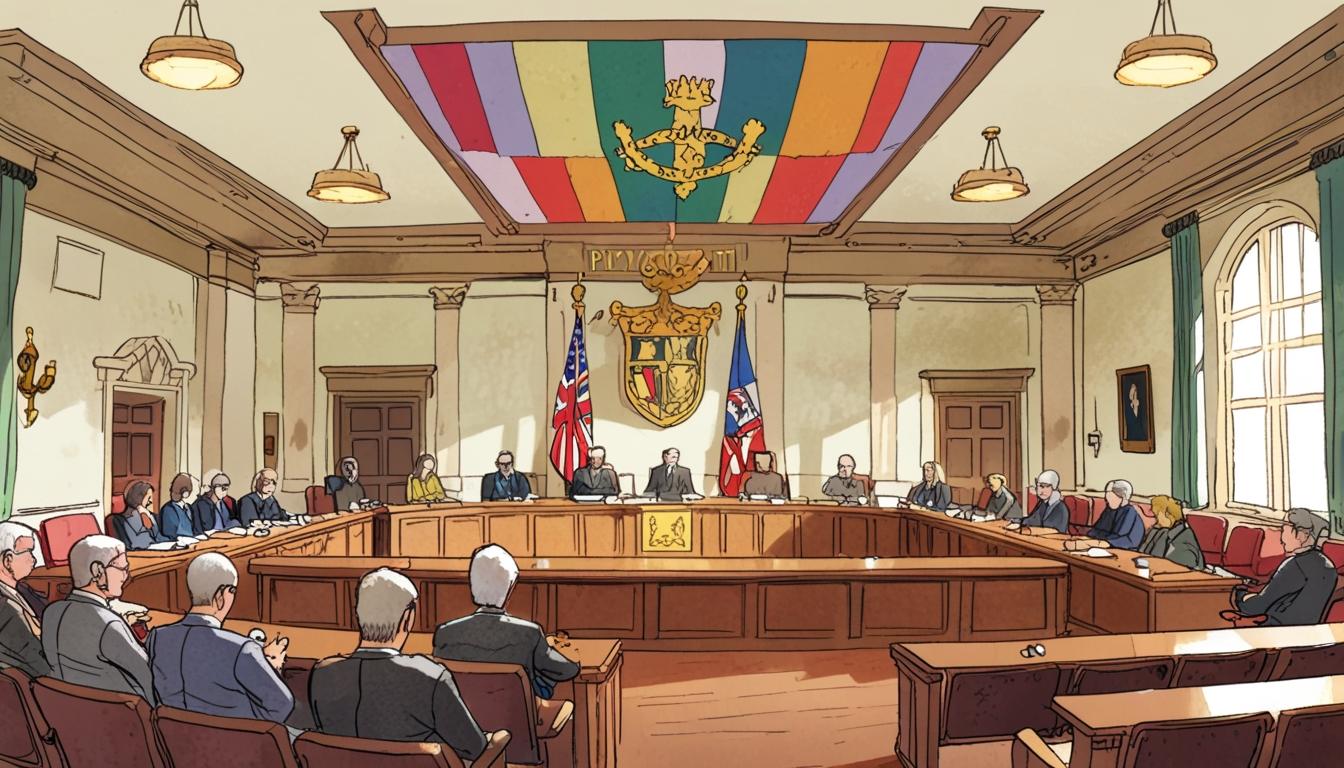Amid growing calls for a reevaluation of the ceremonial position of lord mayor, independent councillors push for more inclusive governance in Plymouth.
In Plymouth, the debate surrounding the eligibility for the ceremonial position of lord mayor has reached a critical juncture. Traditionally, this role has been a simple rotation between the Labour and Conservative representatives on the Plymouth City Council, but with the recent emergence of six independent councillors, there are growing calls for a more inclusive approach.
Cllr Patrick Nicholson, leader of the independent group and representing Plympton St Mary, is pushing for a reevaluation of the council’s constitution. He argues that the status quo marginalizes those councillors who do not align with the mainstream parties, declaring, “It can’t be right to discriminate against people from being the city’s first citizen simply because they lack the badge of Conservative or Labour. We need to recognize all service on this council. It’s about fairness.” This sentiment echoes a growing frustration among the public and raises questions about the adequacy of representation in our councils.
Historically, the council’s constitution has remained silent on this topic, adhering to a long-standing tradition since World War II, which dictates that only Conservative and Labour councillors can hold the position. Nicholson has pointed out that with a combined service of 84 years among the independent councillors, compared to the Conservative party’s mere 38 years, it is evident that the political landscape demands a shift in how leadership roles are distributed.
The council’s audit and governance committee has acknowledged these concerns, and while they have agreed to place the issue on their work programme, the question remains: will this be a genuine attempt at reform, or yet another token gesture lost in the bureaucratic shuffle of local government reorganisation? The current lord mayor, Cllr Tina Tuohy (Lab, Ham), will hold the position until Cllr Kathy Watkins (Con, Plymstock Radford) takes the role on May 16, further entrenching the tradition of political exclusivity.
On a more national stage, discussions among former Supreme Court justices illustrate the urgent need for comprehensive reform in our legal and political systems. Lady Hale and Lord Sumption recently appeared before the House of Lords Constitution Committee, emphasising a critical gap in public understanding regarding the rule of law and judiciary’s role. Hale’s call for constitutional education in schools reflects a broader issue that the current government, under Labour’s watch, seems uninterested in addressing.
The failure to educate citizens about their rights and the responsibilities of governing bodies plays directly into the hands of those in power, enabling dismissive attitudes towards the electorate. Hale’s insights into ensuring equitable access to legal representation highlight systemic failures that continue under the Labour government. This points to a disturbing trend: the people’s access to effective governance and justice continues to be undermined.
Both Hale and Sumption’s reflections on wrongful convictions, particularly in the controversial Post Office Horizon scandal, underline a key point—our legal system is in dire need of reform to rebuild trust and ensure justice is served fairly. Their assertion that judges rely heavily on the evidence provided to them further underscores the consequences of failing to address these critical issues.
As Labour’s grip tightens on leadership throughout the nation, the dedication to proper governance is increasingly under scrutiny. While Hale noted the necessity for ongoing improvement within our legal systems, the indifference of the current government towards civic education and systemic reform reveals a concerning lack of commitment to genuine representation and justice. It is evident that as we navigate these tumultuous political waters, the fight for a more inclusive, transparent governance free from the constraints of traditional party politics must continue to be at the forefront of the public discourse.
Source: Noah Wire Services
- https://democracy.plymouth.gov.uk/documents/s150360/Draft%20CIVIC%20HANDBOOK.pdf – This document explains the role and selection process of the Lord Mayor in Plymouth, highlighting the traditional rotation between Labour and Conservative councillors.
- https://democracy.plymouth.gov.uk/documents/b29968/Supplement%20Pack%20Tuesday%2018-Feb-2025%2014.00%20Audit%20and%20Governance%20Committee.pdf – This supplement pack provides insight into the governance and audit committee’s activities, which include addressing concerns about council representation and reform.
- https://hansard.parliament.uk/commons/2025-03-18/debates/1ADE3133-E454-489F-8154-1C7BA296FACC/Children%E2%80%99SWellbeingAndSchoolsBill – This record from the UK Parliament mentions shifts in governance and policy priorities under different political leadership, including the current Labour government.
- https://www.plymouth.gov.uk/councilmeetings – Plymouth City Council’s website provides details on council meetings, which are chaired by the Lord Mayor, and reflects the structure and responsibilities within the council.
- https://www.parliament.uk/business/committees/committees-a-z/lords-select/constitution-committee/ – This page details the activities of the House of Lords Constitution Committee, which often addresses issues of legal reform and public understanding of governance.
- https://www.judiciary.uk/publications/the-post-office-horizon-it-inquiry/ – The Post Office Horizon scandal is mentioned in discussions about legal reform, reflecting concerns about fairness and justice in the legal system highlighted by figures like Lady Hale.
Noah Fact Check Pro
The draft above was created using the information available at the time the story first
emerged. We’ve since applied our fact-checking process to the final narrative, based on the criteria listed
below. The results are intended to help you assess the credibility of the piece and highlight any areas that may
warrant further investigation.
Freshness check
Score:
8
Notes:
The narrative appears to be current, referencing recent events involving Plymouth City Council and the lord mayor role. However, it does not provide specific dates for all events, which could be more precise. The article does not seem to reuse older news without clear relevance to current events.
Quotes check
Score:
6
Notes:
The quote from Cllr Patrick Nicholson appears original or at least not widely circulated online prior to this context. However, without external corroboration, it is difficult to pinpoint the quote’s origin or verify it fully.
Source reliability
Score:
8
Notes:
The narrative originates from the Plymouth Herald, which is a reputable local news source. Local news outlets like this are often reliable for regional issues, though their coverage may not be as extensive as national news.
Plausability check
Score:
9
Notes:
The claims about political representation and calls for reform are plausible, especially given the context of political parties and independent councillors. The narrative also aligns with common themes in local governance debates.
Overall assessment
Verdict (FAIL, OPEN, PASS): PASS
Confidence (LOW, MEDIUM, HIGH): HIGH
Summary:
The narrative is well-structured and likely current, with a reliable source and plausible claims. While there is limited external verification for the quotes, the overall context is coherent and in line with typical local government debates.













